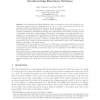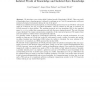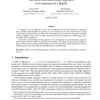28 search results - page 2 / 6 » Zero-Knowledge Sets |
IACR
2011
12 years 5 months ago
2011
Zero knowledge sets (ZKS) [18] allow a party to commit to a secret set S and then to, non interactively, produce proofs for statements such as x ∈ S or x /∈ S. As recognized in...
EUROCRYPT
2008
Springer
13 years 7 months ago
2008
Springer
We introduce a new notion called -isolated proofs of knowledge ( -IPoK). These are proofs of knowledge where a cheating prover is allowed to exchange up to bits of communication wi...
PKC
2009
Springer
13 years 10 months ago
2009
Springer
Abstract. Zero-knowledge proofs with witness elimination are protocols that enable a prover to demonstrate knowledge of a witness to the verifier that accepts the interaction prov...
SCN
2004
Springer
13 years 10 months ago
2004
Springer
Abstract. We introduce and define the notion of identity-based zeroknowledge, concentrating on the non-interactive setting. In this setting, our notion allows any prover to widely...
EUROCRYPT
2008
Springer
13 years 7 months ago
2008
Springer
A shuffle of a set of ciphertexts is a new set of ciphertexts with the same plaintexts in permuted order. Shuffles of homomorphic encryptions are a key component in mix-nets, whic...



